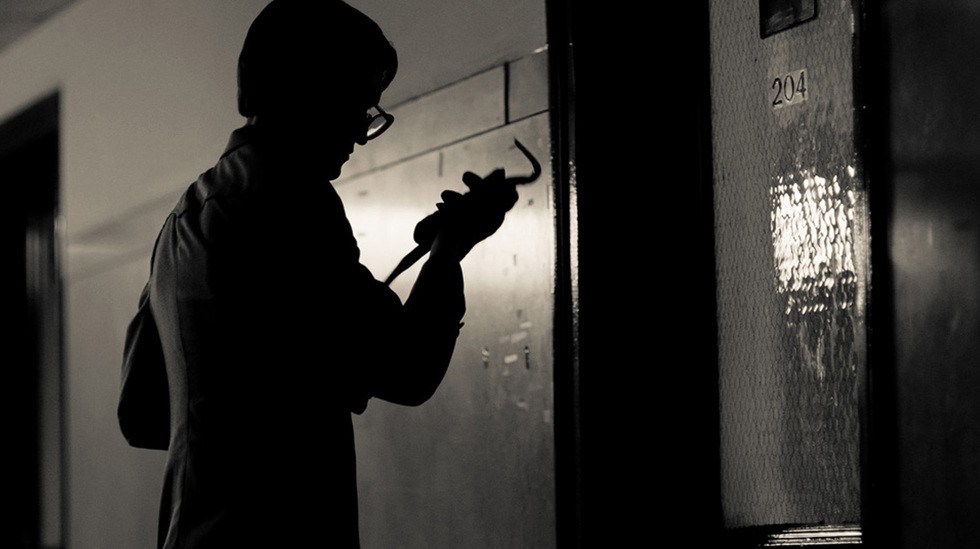Johanna Hamilton has most recently co-produced Pray the Devil Back to Hell, which won Best Documentary at the Tribeca Film Festival in 2008 and was shortlisted for an Academy Award. She has produced nonfiction programs for PBS, The History Channel, National Geographic, A&E, Discovery Channel, and The Washington Post/Newsweek Productions, including September’s Children, a documentary for PBS exploring how children around the world are affected by terrorism and war. (Press materials)
1971 will debut at the Tribeca Film Festival on April 18.
Please give us your description
of the film playing.
A group of ordinary citizens risk everything
on a hunch that the American government is spying on its citizens. In the
process they take on one of the most powerful people in Washington — and they
win! Not only did they find evidence the government was conducting a massive,
illegal spying operation, their actions also helped lead to the first
investigation of U.S. intelligence agencies.
What drew you to this story?
It was thrilling to get to tell
this piece of untold American history. Every aspect of the story was
compelling: a group of ordinary people who put everything on the line to protect
freedom of speech and hold their government accountable. So there was the small
question of moral courage.
It’s also a completely improbable story — they were
complete outsiders who trained themselves to be amateur burglars in order to
break into an FBI office and take documents to share them with the public by leaking
them anonymously to the press. Not only did they manage to pull off a serious
heist, but they manage to evade capture despite one of the largest FBI
investigations of all time. And now they were going to reveal themselves after forty-odd years — it was a scoop!
And then there are two great journalism stories. The decision by the Washington Post to publish stories about the pilfered
documents was a defining moment — an All the President’s Men moment a full
year before the Watergate break-in, and a few months before the Pentagon Papers. And the decision by Carl Stern, an NBC
Justice Department reporter, to sue the DOJ using the Freedom of Information
Act to find out what the term COINTELPRO meant (it was a term on one of the
stolen documents) meant that the public came to learn the full extent of the
secret programs that existed. All in all, it was a completely inspiring and captivating story to tell — I hope it’s an
enthralling one to watch!
What was the biggest challenge?
First off, being a first-time
filmmaker with a film I couldn’t really talk about (the subject matter was
sensitive)! Fundraising for independent
film is always hugely challenging. In this case, I was selective about the
foundations I approached and deliberately avoided all the public pitching
forums (IDFA, Hotdocs) that are usually so enticing.
Secondly, part of the
reason the Citizens’ Commission to Investigate the FBI (the main protagonists
in 1971) had remained undetected for 40+ years was because they left no trace.
There was nothing that existed from the planning, execution and aftermath of
the break-in that is at the center of the story. No notes, no photos, only
memories of the events. So to bring the story to life, I decided to use to
re-creations. I was thrilled to work with [Recreations Producer] Maureen Ryan, who had produced the
recreations for Man on Wire and Project Nim, and is someone whose work I had long
admired.
What advice do you have for
other female directors?
Tenacity and a thick skin are key!
I also found enormous strength and comfort working with a largely female team.
I didn’t go out of my way to build the production team this way; it just happened. It was immensely rewarding, no
drama, and a lot of fun! In terms of funding, it just so happened that the biggest
supporters also turned out to be women, which was incredibly encouraging and
buoyed me.
Do you have any thoughts on what
are the biggest challenges and/or opportunities for the future with the
changing distribution mechanisms for films?
With so many new distribution
opportunities opening up, it’s difficult to figure out how best to window
everything so you aren’t losing traditional opportunities as you try out new
ones.
Name your favorite women
directed film and why.
Jane Campion has such a phenomenal
body of work. The Piano is my favorite because it is such an immersive
experience; there’s too much to describe in one answer. More than the story,
which is extraordinary. More than the acting, which is superlative, including
the two amazing female roles. More than the cinematography that is wondrous.
The whole is just superlative.
But the film that made me do a
double take and really think about the fact that it was directed by a woman was
Point Break by Kathryn Bigelow. It was a testosterone-driven movie and the plot
was far from watertight, but I was captivated by the energy of the fast-paced,
high-adrenaline sequences, and the cinematography in many of those sequences. I
was very impressed — either that or, unbeknownst to me, I’ve always been drawn
to stories that involve the FBI and burglary!







